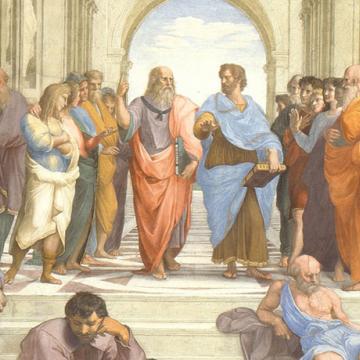Workshop in Ancient Philosophy Week 2 MT17

The School of Athens
Speaker: Guus Eelink (Oxford)
Title: 'Theaetetus 184-186 on the Limitations of Perception'
Abstract:
The final argument (184-186) against the first definition ('knowledge is perception') is one of the most intriguing passages in the Theaetetus. This argument distinguishes between two disjoint classes of properties: perceptible properties (in this context identified with the proper perceptibles: colours, sounds, tastes, etc.) and 'common properties' (koina) (something is a common property if and only if it applies to the objects of multiple senses). One common property is ousia (being). Socrates argues that perception as such cannot involve or yield any thought or judgement that concerns a common property, as perception has no cognitive access to common properties. It is agreed that, whilst the soul examines (episkopein) perceptible properties by means of the senses, it examines the common properties by means of itself, i.e. without using the senses. Socrates then contrasts perceiving a perceptible property (such as hardness) with examining its being (e.g. the being of hardness), and he associates the latter with (a very complex form of) reasoning (analogismata/syllogismos). He goes on to argue as follows: perception cannot attain (tunchanein) being; therefore, perception cannot attain truth; knowledge does attain truth; hence, perception is not knowledge. The issue of what 'attaining being' and 'attaining truth' amount to has sparked considerable controversy in the literature. On the influential 'propositional reading', attaining truth is making true judgements (truth is simply understood as propositional truth; attaining being is interpreted accordingly as a necessary condition for true judgements, such as applying concepts or framing a proposition). However, some interpreters have argued -correctly, I think- that the propositional reading fails to account for the contrast Socrates draws between perception and reasoning concerning the being of (perceptible) properties: Socrates implies that (a very complex form of) reasoning is necessary for attaining being and truth, whereas making true judgements does not necessarily and not even typically involve reasoning (in particular not the very complex form of reasoning Socrates describes). In my talk I shall defend an alternative interpretation of attaining being/truth that does account for the role of reasoning (on my reading attaining being and attaining truth are logically equivalent: they differ at most intensionally): attaining being/truth consists in apprehending what something (in this context a property) really is/grasping the essence of a property (e.g. apprehending what hardness really is). I shall show that this interpretation makes sense of Socrates' overall strategy in the final argument and that it accords with epistemological views we find elsewhere in the Theaetetus (and in Plato generally). I shall argue against two views that are often presupposed by recent interpretations and that would speak against my interpretation: first, the view that being as a common property has nothing to do with essence, but that it is either existence or (as most recent interpretations take it) 'incomplete being' (being something; the notion of being corresponding to the copula); second, the view that one attains being in simply having thoughts or making judgements that concern the common property being. Against these views I shall argue, first, that the notion of being as a common property is, for Socrates, in an important way conceptually dependent on/posterior to the notion of essence (even if, as Socrates suggests, existence or incomplete being count as instances of the common property being), and, second, that Socrates makes two importantly different epistemic distinctions: initially he contrasts perception with thoughts (a very generic epistemic category) concerning the common property being, but at the final stage of the argument he contrasts perception with a very specific epistemic success state: attaining being/truth. I shall argue that attaining being/truth is something that thought can only achieve by means of the complex form of reasoning Socrates contrasts with perception.
Convenors: Dr Karen Margrethe Nielsen, Prof Ursula Coope, and Dr Luca Castagnoli
Webpage: Workshop in Ancient Philosophy




